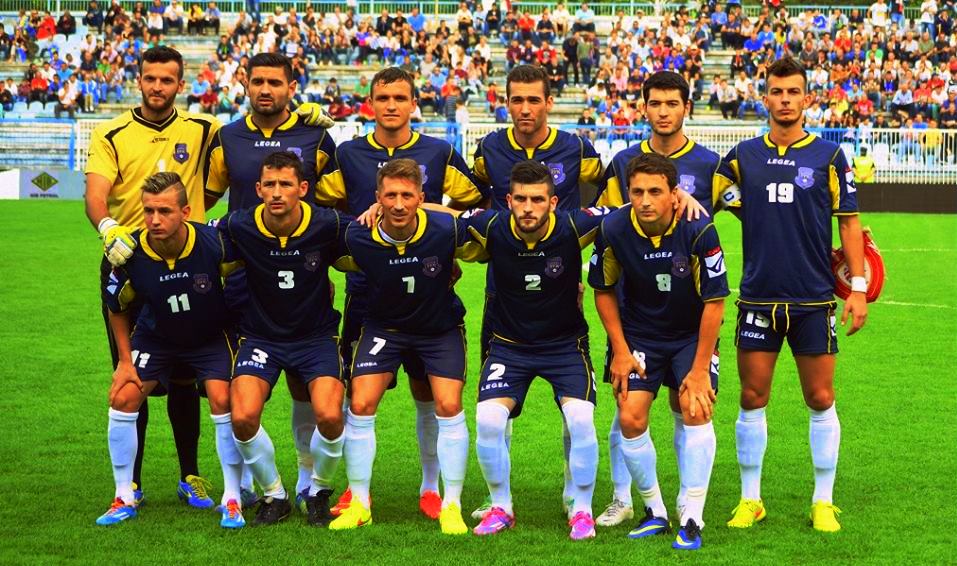KOSOVO head into their first competitive fixture on Monday evening, still waiting to hear whether players of Kosovar roots who have represented other countries will be eligible to play.
Kosovo travel to Finland to make their World Cup qualification debut, months after they became members of FIFA and UEFA in May.
The disputed territory of Kosovo declared independence from Serbia in 2008 and as yet, are not members of the United Nations. Up until now, they have only been permitted to play unofficial friendly matches by FIFA.
The team facing Finland in Turku’s Veritas Stadion on Monday will be drawn from across Europe, a result of the diaspora following the Kosovo War between 1998 and 1999.
Many of those Kosovo-Albanian families fleeing the conflict settled in Switzerland.
The first round Euro 2016 group match between Switzerland and Albania saw 7 of the Swiss squad and 11 of the Albanian, drawn from players of Kosovan heritage who were either born or brought up in Switzerland. They included the Xhaka brothers, Granit and Taulant who lined up against each other.

The match came weeks after Kosovo’s admission into FIFA, with Arsenal’s Xhaka, Stoke City midfielder Xherdan Shaqiri and Valon Behrami of Watford (all of whom campaigned for a Kosovan national team) believing that special circumstances would see them eligible to play for Kosovo after the tournament.
However, FIFA have since ruled that those who played for another country after membership status was granted would not be available to play for Kosovo.
One player awaiting an answer on whether he can play on Monday, is Amir Rrahmani who actually scored against Kosovo for Albania in a friendly last October.
Kosovo’s emergence as a footballing nation has been far from smooth and saw fierce resistance from Serbian authorities. Article 10 of the FIFA statutes states that only “an independent state recognized by the international community” may be admitted. Tomislav Karadzic, president of the Serbian federation angrily compared Kosovo’s admittance to “opening Pandora’s box” warning that a dangerous precedent had been set.
Nervous about seeing a drain of talent to the new Kosovan national side, Swiss authorities have urged Kosovo not to put pressure on players to switch allegiance, whereas many Albanian fans see players who have defected as guilty of treason.
On the field, Kosovo have been handed a tough qualification group for Russia 2018 having been drawn with Croatia, Turkey, Ukraine, Iceland and Monday night’s opponents Finland in Group I. Although no minnows, amidst the chaos, confusion and the disappointment of not having Xhaka and co available, Kosovo are rank outsiders for qualification. The 2020 European Championships look to be a more realistic target.
Meanwhile, amidst a backdrop of apathy among fans and antipathy towards international authorities, Sam Allardyce will take charge of England for the first time in Slovakia on Sunday.
Following England’s exit from Euro 2016 at the hands of Iceland, Allardyce knows that international football has become an unwanted distraction from the club game for many players and fans alike.
Allardyce, seeking to draw on a wider breadth of talent, has indicated he would break with tradition and select players born overseas who qualify for England under the residency rule. Sevilla midfielder Stephen N’Zonzi, who lived in England for 5 years whilst playing for Blackburn and Stoke City, was approached by the FA who later found he was ineligible having previously played for France’s Under 21s.
FIFA and UEFA have many complicated decisions to make around how Kosovo’s admission to international football will pan out. For example, what will become of the Kosovan teams who still play in Serbian leagues?
However, if a player can represent a country other than that of his heritage purely because he earned a wage playing in that country; surely the likes of the Xhaka brothers should be able to represent a country in Kosovo who they would so proudly serve?
Nationality is always going to be a personal thing but if FIFA and UEFA want to preserve the spirit and importance of international football, players must be allowed to represent the country they feel closest to culturally.
Kosovo may not yet know who will play for them on Monday night, but they do know that team will take to the field with a pride in the shirt that would put many more established nations to shame.

